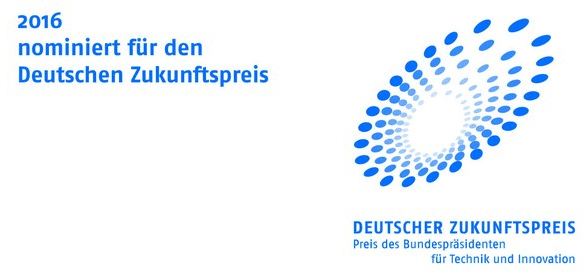Sep 22 2016
Among the circle of excellence: Dresden-based Carbon Concrete researches are nominated for the “Deutscher Zukunftspreis 2016” (German Future Prize) – the Federal President’s Award for Innovation and Technology
 DZP
DZP
Prof. Manfred Curbach, Director of the Institute of Concrete Structures at Technische Universität Dresden, Chokri Cherif, Director of the Insitute of Textile Machinery and High Performance Material Technology as well as his predecessor Prof. em. Peter Offermann, chairman of the board of the Tudalit Alliance and member of the advisory board at the Deutsches Zentrum Textilbeton (German Centre for Textile Reinforcement) have been nominated for the prestigious award.
The team’s nomination has been announced today at the Deutsche Museum in Munich. The three professors are among the world’s leading experts in carbon concrete research and successfully drive the material’s introduction to the market. They succeeded in developing a corrosion-resistant and resource-conserving alternative to the conventional reinforced concrete. Using the mesmerising carbon concrete composite material – a combination of special concrete and carbon fibre – they mark the beginning of a new construction era.
Approximately 50 thousand individual fibres, which are significantly thinner than human hair, are woven into a yarn and processed into a coated grid structure. Compared to steel, carbon is four times lighter and has six times the bearing capacity.
Reinforced concrete was invented 150 years ago and is to date the most used material, second only to water. The main weakness of reinforced concrete is the steel’s susceptibility to corrosion. In order to protect it from corrosion a thick concrete layer is required, among other things. Since carbon does not rust, no further protective layers are necessary. Furthermore, using carbon concrete it is now possible to construct in a thinner and more filigree manner and to create buildings that have a significantly longer expected lifetime and to design building geometries which would be virtually impossible to implement with reinforced concrete.
The Federal Ministry of Education and Research has recognised the enormous potential of carbon concrete composite and since 2014 has been funding the interdisciplinary construction research project C³ – Carbon Concrete Composite with up to 45 million Euros. In addition, about 23 million Euros of own funds have been contributed by the 145 involved partners. The lead management rests with the Technische Universität Dresden under the chairmanship of Manfred Curbach. Companies and researchers participating in the C³ project, leading among them Peter Offermann and Chokri Cherif, join forces to gradually implement scientific insights into practice. Examples of successful implementations of carbon concrete technology are: the newly constructed foot and bicycle path in Albstadt and Kempten, the pavilions on Kahla and Aachen, the renovated storey ceiling of a residential and commercial building in Prague, the refurbished barrel vault of the Zwickau tax office, the repaired railway bridge in Nailia and the renovated sugar silos in Uelzen.
“The nomination of three TU Dresden professors for the „Deutscher Zukunftspreis“ impressively demonstrated the significance of knowledge transfer and the networking of science and economy in Dresden,” says Prof. Hans Müller-Steinhagen, rector of TU Dresden. “One can witness the creation of a novel material – starting from an idea and the fundamental research all the way through to the commercial, market launch. Here, we lay the foundations for new, durable and flexible building constructions, which will surely enthral future generations through their aesthetics.”
The Federal President’s “Deutscher Zukunftspreis” (German Future Prize) is one of the most prestigious and important scientific prizes in Germany. The nomination as being “among the circle of excellence” is already an honour in itself. The Federal President commends individuals or groups of people who make outstanding innovations in technology, engineering or natural sciences marketable. Three teams in total have been nominated for the “Deutscher Zukunftspreis”. On 30th November, Federal President Joachim Gauck will award the winners in Berlin.